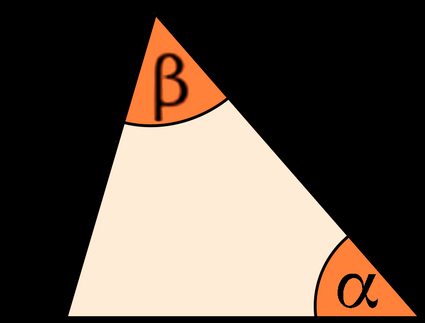AAS Triangle Calculator
Use the AAS triangle calculator to calculate the area and the rest of the dimensions of an AAS triangle.
In the accompanying text of this tool, we discuss:
- The AAS triangle congruence;
- How to solve an AAS triangle;
- How to calculate the height for an AAS triangle; and
- How to obtain the AAS triangle formula for area.
Enjoy! 🔺
What is AAS triangle congruence?
AAS stands for Angle-Angle-Side. An AAS triangle is a triangle in which one side , the opposite , and adjacent angles are known.

In geometry, two figures or objects are said to be congruent if their shape and size are the same. Triangles classification in SAS, SSS, ASA, or AAS simplifies the study of triangle congruence.
In the case of AAS triangles, two triangles are congruent if two consecutive angles and the non-included side of one triangle are equivalent to the corresponding two angles and side of the second triangle. These are AAS congruent triangles.
How to solve an AAS triangle — Angle and sides
If we have an AAS triangle and want to know the other three dimensions: , , and , we can resort to some good old never-out-of-style trigonometry.

Let's see how to calculate them:
Third angle
For this one, we need to remember that the internal angles of any triangle will always add or . With this in mind, simply subtract the two known values of the angles from to find the missing angle:
Sides and
For these two, we'll be using the law of sines:
We may start by finding the expression to calculate the base , since the side , angles , and are all known:
Similarly, given that we have an expression for the angle , we can use the following equation derived from the law of sines to determine the side :
or
How to find the area of an AAS triangle
To find the AAS triangle's area, we'll be using the general triangle area formula:

In the case of our AAS triangle, the initial known dimensions are the side and angles and :

Notice from the area equation that we'll need to know the base and height to be able to calculate the area. In the previous section, we already mentioned how to calculate with the law of sines:
We need to figure out how to obtain the height . By drawing the height of the triangle, our triangle will be divided into two right triangles:
- The triangle of hypotenuse and height ; and
- The triangle with hypotenuse and height .

In this case, since we have the value for the side , we'll use the first triangle. By employing the expression for the sine of the angle , we can clear the height :
Even though is not initially provided, we already saw that we can easily obtain its value by subtracting and from — .
All that's left is to replace all of these expressions in our original area formula:
To express the area only in terms of the initial knowns, we can use the properties of sines: . Therefore . Then the AAS triangle area formula is:
How to use the AAS triangle calculator
Use the AAS triangle calculator to determine the area, third angle, and the two missing sides of this type of triangle. Let's have a look at how to use this tool:
- In the first section of the calculator, enter the known values of the AAS triangle. These are the two consecutive angles
βandαand the non-included sidea. - In the section
Results, the calculator will show you the results of the AAS triangle. Here you'll get the angleγ, other sidesbandc, heighth, and theAreaof the triangle. - You are done! 😀
More triangle calculators
If you enjoyed using the AAS triangle calculator, you might be interested in some of our other triangle-related tools:
- Triangle area calculator;
- AAA triangle calculator;
- Midsegment of a triangle calculator;
- Acute triangle calculator;
- Circumcenter calculator;
- Triangle congruence calculator;
- Obtuse triangle calculator;
- Oblique triangle calculator;
- Base of a triangle calculator;
- SAS triangle calculator;
- SSS triangle calculator; and
- ASA triangle calculator.
How do I know if a triangle is AAS or ASA?
AAS and ASA are triangles with two known angles and one known side. The difference is in the order of the knowns. In the AAS, one side and the opposite and adjacent angles are known. In the ASA, the knowns are two angles and the side between them.
How do I calculate the height of an AAS triangle?
If the known dimensions are the consecutive angles α and β and the non-included side a, to calculate the height h of an AAS triangle:
- Determine the missing angle
γ:
γ = π - α - β - The formula for height reads:
h = a × sin(γ) - That's it!
P.S. When substituting values, make sure that all angles are in the same unit, either degrees or radians.
What is the area of an AAS triangle of 40°, 25° and 16 cm?
The area is 76.27 cm2. To calculate the area of an AAS triangle of dimensions a = 16 cm, α = 40° and β = 25°:
- Use the area formula:
A = (1/2) × a² × sin(β) × sin(α+ β) / sin(α) - Substitute the known values:
A = (1/2) × (16 cm)² × sin(25°) × sin(40° + 25°) / sin(40°) - Execute the calculations to obtain area's value:
A = 76.27 cm²
